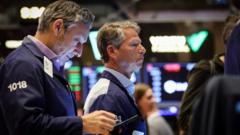President Donald Trump is poised to announce new tariffs this week that will target all countries, a move that could impact global markets and raise fears of a recession in the U.S. Despite earlier indications of potentially scaling back plans, Trump affirms the measures as vital for protecting American trade interests.
Trump Plans Broad Tariffs, Potentially Impacting Global Trade

Trump Plans Broad Tariffs, Potentially Impacting Global Trade
President Trump's upcoming tariffs, set to be announced this week, aim to affect all nations, raising concerns over a global trade war and its repercussions on the economy.
President Donald Trump has indicated that new tariffs set to be announced this week will impact all countries, a move that is generating significant concern regarding the potential repercussions for global trade dynamics. Trump has referred to this initiative as America's "Liberation Day," suggesting a major shift in trade policy, expanding beyond tariffs currently imposed on countries like China, particularly on steel, aluminum, and vehicles.
In a statement aboard Air Force One, Trump emphasized, "You'd start with all countries," reinforcing the idea that these measures would not just be limited to nations with significant trade deficits with the U.S. This marks a departure from prior discussions suggesting a focused approach targeting 10 to 15 countries facing the worst trade imbalances, as outlined by White House economic adviser Kevin Hassett.
The proposed tariffs are viewed by the administration as a method to safeguard the U.S. economy from what they term "unfair competition," while simultaneously serving as a bargaining chip to secure better trade terms. Trump's administration projects significant revenue generation from these tariffs, with estimates suggesting they could raise trillions of dollars and potentially create millions of jobs within the U.S., with a particularly ambitious claim of $600 billion from the planned tariffs on all imports.
Market reactions have been negative, with Asian stock indices reflecting investor anxiety regarding the broader implications of a potential trade war. The Nikkei 225 dropped over 3%, while the ASX 200 and South Korea's Kospi also experienced declines. These market responses highlight the growing apprehension about the economic fallout that may arise from escalating trade tensions.
Amid ongoing discussions about tariffs, some countries, including members of the EU and Canada, are preparing retaliatory measures, which add further uncertainty to international trade relations. Meanwhile, Trump has also expressed confidence in achieving a deal concerning ByteDance, the Chinese owner of TikTok, before an impending deadline set for April 5, indicating the multifaceted nature of current U.S. trade negotiations.
With these developments, nations around the world are closely monitoring the situation as they assess the looming changes to U.S. trade policies and prepare for the potential consequences.






















